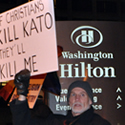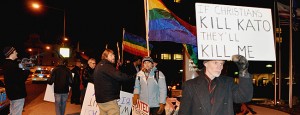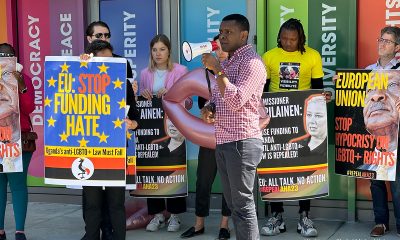National
LGBT activists protest National Prayer Breakfast
Obama speaks of importance of faith in remarks

Protesters gathered at the Washington Hilton in D.C. on Thursday to denounce the National Prayer Breakfast taking place in the hotel and to shed light on the event organizer’s connection to anti-gay activity in Uganda.
About two dozen activists — affiliated with GetEQUAL, a group responsible for organizing protests and acts of civil disobedience across the country over LGBT issues — participated in what they called a “Breakfast without Bigotry” to draw attention to the Foundation’s work overseas.
The Foundation, also known as “The Family,” is a U.S. evangelical group that reportedly has promoted anti-LGBT views abroad. The organization, which couldn’t be reached for comment for this article, has ties to David Bahati, a lawmaker in Uganda who authored pending legislation that would institute the death penalty for homosexual acts.
Last week, the Uganda anti-gay bill received renewed attention when David Kato, an activist who was working against the pending measure, was brutally murdered after a publication in the country identified him as gay.
Clad in heavy coats and carrying harm-warmers as they braved the February cold, protesters waived Pride flags and held up signs reading “If Christians Kill Kato, They’ll Kill Me” and “David Kato: Brutally Loved to Death by Christian Missionaries.”
Activists chanted, “One, two, three, four, don’t let the Family hide any more,” and, “Hey, hey, ho, ho, the Uganda bill has got to go.”
As the motorcade approached the Washington Hilton carrying to the event President Obama, who was in attendance at the breakfast, protesters belted out the song, “We Shall Overcome.”
Dan Fotou, eastern region field director for GetEQUAL, said the intent of the protest was to inform the public about the Foundation’s involvement with anti-gay activity abroad in places like Uganda.
“The goal is to educate the attendees [about] not only the Family’s role in this, but also in their role in this Uganda “Kill the Gays” bill and their reach worldwide,” Fotou said. “What they’re really trying to do is annihilate LGBT people.”
Carol Lautier, 42 and a queer D.C. resident, said she was at the protest “as a progressive Christian” and that her views are often unheard among Christian audiences.
“I think it’s important that Christian evangelicals not have the corner market on Christianity,” she said. “We need to enter the conversation that’s being dominated by conservatives.”
Many of the protest participants expressed displeasure with Obama’s participation in the National Prayer Breakfast. U.S. presidents have taken part in the breakfast consistently since the Eisenhower administration.
During his remarks at the event, Obama emphasized the importance of his faith as a guiding force for him during his presidency.
“And it is my faith, then, that biblical injunction to serve the least of these, that keeps me going and that keeps me from being overwhelmed,” Obama said. “It’s faith that reminds me that despite being just one very imperfect man, I can still help whoever I can, however I can, wherever I can, for as long as I can, and that somehow God will buttress these efforts.”
The president made no mention of Uganda or the Foundation’s ties to anti-gay initiatives abroad during his remarks.
Fotou said he would prefer Obama didn’t participate in the breakfast and would stand on the side of those who were critical of the gathering.
“It gives prestige to this breakfast,” Fotou said. “So, I would rather that they didn’t raise their stature worldwide by attending and speaking. I would ask that he didn’t [attend] this morning and breakfasts in the future.”
Shin Inouye, a White House spokesperson, noted that the president has spoken out against the killing of Kato and alluded to the Uganda anti-gay bill last year during his speech at the National Prayer Breakfast.
“As you heard this morning, the President used this opportunity to reflect on how his faith has sustained him over the last few years,” Inouye said. “It’s worth noting that it was at this venue that last year the president strongly condemned the proposed legislation in Uganda.”
Last week, in response to the murder of Kato, Obama issued a statement that “LGBT rights are not special rights; they are human rights” and recommitted his administration to “strongly support[ing] human rights and assistance work on behalf of LGBT persons abroad.”
But protester Janelle Mungo, 23, a straight D.C. resident, said speaking about the protest last year shouldn’t be enough for Obama.
“I think the fact that he spoke against the bill last year isn’t enough,” she said. “He should be speaking out against the breakfast, and not be there.”
At the beginning of the protest, activists positioned themselves on the sidewalk directly in front of the Washington Hilton, but later situated themselves across the street after D.C. police directed them to move.
Heather Cronk, managing director of GetEQUAL, said police told protesters they had to move from their initial position because they lacked a permit.
“We went to get a protest permit last week and we were told that we didn’t need one because we were going to be on public property rather than the private property of the hotel,” she said. “The police are now telling us — apparently at the request of Secret Service — that we had to be across the street.”
Cronk added that she knows Secret Service directed D.C. police to move the protesters because the officers were overheard discussing the Secret Service’s involvement in the decision.
Federal Government
Lambda Legal praises Biden-Harris administration’s finalized Title IX regulations
New rules to take effect Aug. 1

The Biden-Harris administration’s revised Title IX policy “protects LGBTQ+ students from discrimination and other abuse,” Lambda Legal said in a statement praising the U.S. Department of Education’s issuance of the final rule on Friday.
Slated to take effect on Aug. 1, the new regulations constitute an expansion of the 1972 Title IX civil rights law, which prohibits sex-based discrimination in education programs that receive federal funding.
Pursuant to the U.S. Supreme Court’s ruling in the landmark 2020 Bostock v. Clayton County case, the department’s revised policy clarifies that discrimination on the basis of sexual orientation and gender identity constitutes sex-based discrimination as defined under the law.
“These regulations make it crystal clear that everyone can access schools that are safe, welcoming and that respect their rights,” Education Secretary Miguel Cardona said during a call with reporters on Thursday.
While the new rule does not provide guidance on whether schools must allow transgender students to play on sports teams corresponding with their gender identity to comply with Title IX, the question is addressed in a separate rule proposed by the agency in April.
The administration’s new policy also reverses some Trump-era Title IX rules governing how schools must respond to reports of sexual harassment and sexual assault, which were widely seen as imbalanced in favor of the accused.
Jennifer Klein, the director of the White House Gender Policy Council, said during Thursday’s call that the department sought to strike a balance with respect to these issues, “reaffirming our longstanding commitment to fundamental fairness.”
“We applaud the Biden administration’s action to rescind the legally unsound, cruel, and dangerous sexual harassment and assault rule of the previous administration,” Lambda Legal Nonbinary and Transgender Rights Project Director Sasha Buchert said in the group’s statement on Friday.
“Today’s rule instead appropriately underscores that Title IX’s civil rights protections clearly cover LGBTQ+ students, as well as survivors and pregnant and parenting students across race and gender identity,” she said. “Schools must be places where students can learn and thrive free of harassment, discrimination, and other abuse.”
Michigan
Mich. Democrats spar over LGBTQ-inclusive hate crimes law
Lawmakers disagree on just what kind of statute to pass

Michigan could soon become the latest state to pass an LGBTQ-inclusive hate crime law, but the state’s Democratic lawmakers disagree on just what kind of law they should pass.
Currently, Michigan’s Ethnic Intimidation Act only offers limited protections to victims of crime motivated by their “race, color, religion, gender, or national origin.” Bills proposed by Democratic lawmakers expand the list to include “actual or perceived race, color, religion, gender, sexual orientation, gender identity or expression, ethnicity, physical or mental disability, age, national origin, or association or affiliation with any such individuals.”
Democratic Gov. Gretchen Whitmer and Attorney General Dana Nessel have both advocated for a hate crime law, but house and senate Democrats have each passed different hate crimes packages, and Nessel has blasted both as being too weak.
Under the house proposal that passed last year (House Bill 4474), a first offense would be punishable with a $2,000 fine, up to two years in prison, or both. Penalties double for a second offense, and if a gun or other dangerous weapons is involved, the maximum penalty is six years in prison and a fine of $7,500.
But that proposal stalled when it reached the senate, after far-right news outlets and Fox News reported misinformation that the bill only protected LGBTQ people and would make misgendering a trans person a crime. State Rep. Noah Arbit, the bill’s sponsor, was also made the subject of a recall effort, which ultimately failed.
Arbit submitted a new version of the bill (House Bill 5288) that added sections clarifying that misgendering a person, “intentionally or unintentionally” is not a hate crime, although the latest version (House Bill 5400) of the bill omits this language.
That bill has since stalled in a house committee, in part because the Democrats lost their house majority last November, when two Democratic representatives resigned after being elected mayors. The Democrats regained their house majority last night by winning two special elections.
Meanwhile, the senate passed a different package of hate crime bills sponsored by state Sen. Sylvia Santana (Senate Bill 600) in March that includes much lighter sentences, as well as a clause ensuring that misgendering a person is not a hate crime.
Under the senate bill, if the first offense is only a threat, it would be a misdemeanor punishable by one year in prison and up to $1,000 fine. A subsequent offense or first violent hate crime, including stalking, would be a felony that attracts double the punishment.
Multiple calls and emails from the Washington Blade to both Arbit and Santana requesting comment on the bills for this story went unanswered.
The attorney general’s office sent a statement to the Blade supporting stronger hate crime legislation.
“As a career prosecutor, [Nessel] has seen firsthand how the state’s weak Ethnic Intimidation Act (not updated since the late 1980’s) does not allow for meaningful law enforcement and court intervention before threats become violent and deadly, nor does it consider significant bases for bias. It is our hope that the legislature will pass robust, much-needed updates to this statute,” the statement says.
But Nessel, who has herself been the victim of racially motivated threats, has also blasted all of the bills presented by Democrats as not going far enough.
“Two years is nothing … Why not just give them a parking ticket?” Nessel told Bridge Michigan.
Nessel blames a bizarre alliance far-right and far-left forces that have doomed tougher laws.
“You have this confluence of forces on the far right … this insistence that the First Amendment protects this language, or that the Second Amendment protects the ability to possess firearms under almost any and all circumstances,” Nessel said. “But then you also have the far left that argues basically no one should go to jail or prison for any offense ever.”
The legislature did manage to pass an “institutional desecration” law last year that penalizes hate-motivated vandalism to churches, schools, museums, and community centers, and is LGBTQ-inclusive.
According to data from the U.S. Department of Justice, reported hate crime incidents have been skyrocketing, with attacks motivated by sexual orientation surging by 70 percent from 2020 to 2022, the last year for which data is available.
Twenty-two states, D.C., Puerto Rico, and the U.S. Virgin Islands have passed LGBTQ-inclusive hate crime laws. Another 11 states have hate crime laws that include protections for “sexual orientation” but not “gender identity.”
Michigan Democrats have advanced several key LGBTQ rights priorities since they took unified control of the legislature in 2023. A long-stalled comprehensive anti-discrimination law was passed last year, as did a conversion therapy ban. Last month the legislature updated family law to make surrogacy easier for all couples, including same-sex couples.
A bill to ban the “gay panic” defense has passed the state house and was due for a Senate committee hearing on Wednesday.
Indiana
Drag queen announces run for mayor of Ind. city
Branden Blaettne seeking Fort Wayne’s top office

In a Facebook post Tuesday, a local drag personality announced he was running for the office of mayor once held by the late Fort Wayne Mayor Tom Henry, who died last month just a few months into his fifth term.
Henry was recently diagnosed with late-stage stomach cancer and experienced an emergency that landed him in hospice care. He died shortly after.
WPTA, a local television station, reported that Fort Wayne resident Branden Blaettne, whose drag name is Della Licious, confirmed he filed paperwork to be one of the candidates seeking to finish out the fifth term of the late mayor.
Blaettner, who is a community organizer, told WPTA he doesn’t want to “get Fort Wayne back on track,” but rather keep the momentum started by Henry going while giving a platform to the disenfranchised groups in the community. Blaettner said he doesn’t think his local fame as a drag queen will hold him back.
“It’s easy to have a platform when you wear platform heels,” Blaettner told WPTA. “The status quo has left a lot of people out in the cold — both figuratively and literally,” Blaettner added.

The Indiana Capital Chronicle reported that state Rep. Phil GiaQuinta, who has led the Indiana House Democratic caucus since 2018, has added his name to a growing list of Fort Wayne politicos who want to be the city’s next mayor. A caucus of precinct committee persons will choose the new mayor.
According to the Fort Wayne Journal Gazette, the deadline for residents to file candidacy was 10:30 a.m. on Wednesday. A town hall with the candidates is scheduled for 6 p.m. on Thursday at Franklin School Park. The caucus is set for 10:30 a.m. on April 20 at the Lincoln Financial Event Center at Parkview Field.
At least six candidates so far have announced they will run in the caucus. They include Branden Blaettne, GiaQuinta, City Councilwoman Michelle Chambers, City Councilwoman Sharon Tucker, former city- and county-council candidate Palermo Galindo, and 2023 Democratic primary mayoral candidate Jorge Fernandez.
-

 Africa4 days ago
Africa4 days agoCongolese lawmaker introduces anti-homosexuality bill
-

 District of Columbia1 day ago
District of Columbia1 day agoReenactment of first gay rights picket at White House draws interest of tourists
-

 World4 days ago
World4 days agoOut in the World: LGBTQ news from Europe and Asia
-

 Arizona1 day ago
Arizona1 day agoAriz. governor vetoes anti-transgender, Ten Commandments bill











